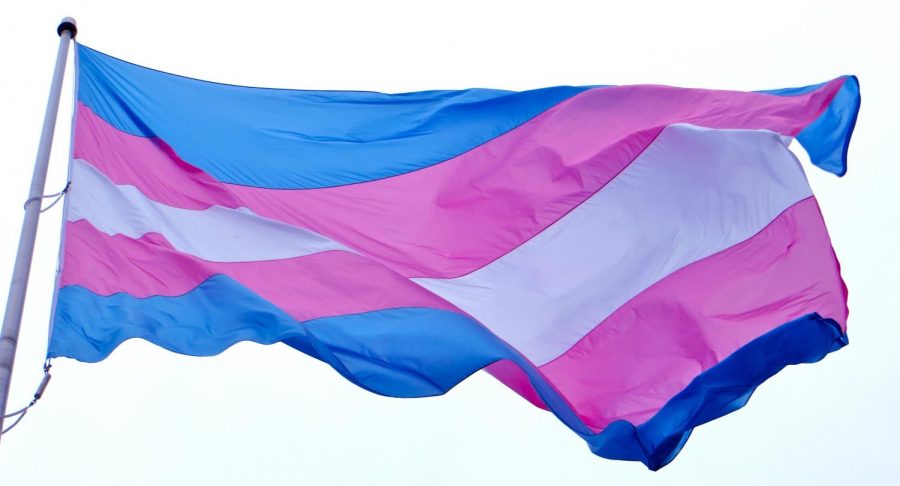Talking Trans: In Case You Didn’t “Noah”
The transgender flag represents people whose gender identity does not match what they were assigned at birth.
September 13, 2018
All experiences in this article belong only to the subject of the article, and may not be universal to larger populations.
Coronado’s GSTA is an epicenter of different people; names, pronouns, and intricate combinations of orientations and identities abound. If a Coronado student is interested in finding an accepting community, or simply interested in learning about the LGBT+ students that make up a significant portion of our population, Ms. Jacobs’s room on Monday afternoons is the place to be. This is where I met Noah Sczepanski, a freshman able to be picked out of a crowd by looking for a puffy ponytail on top of his head and gold wire-framed glasses.
Noah identified himself as a pansexual, transgender male who uses either he/him or they/them pronouns. The Merriam-Webster defines transgender as “of, relating to, or being a person whose gender identity differs from the sex the person had or was identified as having at birth,” and pansexual as “of, relating to, or characterized by sexual desire or attraction that is not limited to people of a particular gender identity or sexual orientation.” Noah defined these terms in their own terms for clarity, saying that “transgender means that I was born as a girl and I identify as a boy. It just feels right to me. And pansexual means I date people no matter their gender.”
Noah’s journey of identity, like the journeys of many people in the LGBT+ community, took quite a few twists and turns before arriving at this point. Noah mentioned that when he was younger, he realized he does not identify as a girl, and then cycled through multiple labels. After identifying as agender, genderqueer, and genderfluid at different points, Noah eventually settled on the label they now use.
Changing pronouns and labels is intended to make life easier for LGBT+ people, but Noah says that sometimes “it sucks, you know. It’s not like it’s a fun experience to have to have people be like, ‘oh, your name is this.’ And I’m like ‘no, it’s not!’ And they’re like, ‘yes it is.’” To Noah, it seems obvious that they are who they are, and when other people don’t see him the same way he does, it can get frustrating. “If you say a sandwich is a sandwich,” they explained, trying to give a metaphor for clarity, “and someone’s like, ‘no it’s not,’ it’s a really big argument. It really sucks.”
Noah’s friendships and school life have evolved about as much as his gender identity has. “I lost many of my friends from elementary school that I used to be friends with, that’s not a big deal,” they explained, describing some of what most high school students have experienced. “But I still have friends that don’t listen to what I have to say or my point of view or who I am.” Everyone has had a bad relationship or friendship, but his friendships and relationships include an extra level of difficulty because of transitioning. “In one of my past relationships, she kept – she never called me by my name or my pronouns, ever,” they added.
Relationships with teachers have also been a struggle. He admitted that in his time at Coronado so far, he still hasn’t told a teacher about his preferred name or pronouns. “I’ve always wanted to,” he said, shrugging, “and I’ve told myself that I’m at a different school now, and I’m in high school, so I should at least tell one teacher ‘hey this is me, this is my name.’” Coming out to people is usually recognized as a difficult endeavor, which might be a big reason that Noah hasn’t said anything yet. He wishes that teachers would be less afraid to start polite conversations with students about names and pronouns “one on one, not in front of the entire class.”
Despite the trouble they go through, they seem to be happy with how things have turned out. Noah has joined the GSTA, and seems to be happy with the move from middle school to high school. “I think it feels very different here, because I can tell that people are more open – well, most of the people here are more open to different ideas and different concepts,” he said about Coronado.
Noah feels like Coronado is an accepting place, but of course any place can use improvement. He suggested that the students and teachers of Coronado, when talking to LGBT+ peers, should make an effort to “understand what they’re going through and how their life is, because it’s hard when you hear someone who’s not going to listen to you.”


